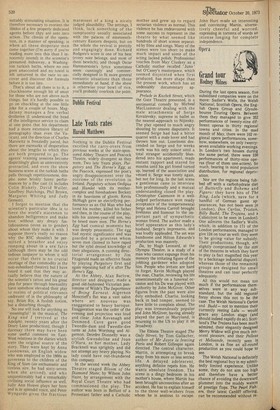Dublin Festival
Late Yeats rates
Harold Matthews
Nothing in the Dublin Festival excelled the carry-overs from previous weeks at the state-sponsored Abbey Theatre and Peacock Theatre, widely divergent as they were. Two late Yeats plays, Purgatory and The Herne's Egg, at the Peacock, expressed the poet's angry disappointment over the outcome of the revolution in Ireland. Purgatory echoes Oedipus and Hamlet with its mothercomplex and foreshadows Beckett in its heaviness of gloom. Kevin McHugh gave an electrifying performance as an Old Man who had loved his mother, killed his father and then, in the course of the play, kills his sixteen-year-old son, lest he breed more men. The Herne's Egg had comical moments but was deeply pessimistic. The egg had mystic significance and was guarded by a priestess whom seven men claimed to have raped but the sybil denied knowledge of their allegations. A cunning directorial arrangement by Jim Fitzgerald made an effective finale by playing Purgatory first and again repeating half of it after The Herne's Egg. At the Abbey, Alan Barlow, director and designer, made a good old-fashioned Victorian pantomime of Wilde's The Importance of Being Earnest. Algernon Moncrieff's flat was a vast salon where art nouveau was exaggerated to heavy baroque. Exaggeration was the order of the evening and projection was loud and clear. John Kavanagh and Desmond Cave gave good Tweedle-dum and Tweedle-dee turns as John Worthing and Algernon. Deirdre Donnelly was a stylish Gwendoline and Joan O'Hara, as her mother, Lady Bracknell was sprightly and did not attempt any heavy playing. No lady could have out-thundered this company.
In the second week the Abbey Theatre staged Bloom of the Diamond Stone, by Wilson John Haire, by arrangement with the Royal Court Theatre who had commissioned the play. The author was born in Belfast of a Protestant father and a Catholic
mother and grew up to regard sectarian violence as normal. This violence he has endeavoured with some success to represent in the theatre by what seemed like hundreds of short scenes separated by films and songs. Many of the scenes were too short to make much impact and some of the acting lacked polish. Professional touches from May Cluskey as a Catholic mother recalled 'Juno' but O'Casey's masterpiece, which seemed disjointed when first produced, has more shape than the present work, which has an undeniably documentary appearance.
Prelude in Kazbek Street, which the Gate Theatre presented, is a sentimental comedy by Micheal MacLiammoir dealing with the male attachments of Serge Kovalevsky, supreme in ballet as the nearest .approach to Nijinsky. The play opened to much angry shouting by unseen disputants. It seemed Serge had had a bitter quarrel with a male lover and had thrown him out. Loneliness descended on Serge and for weeks work was his only solace until a total stranger accidentally blundered into his apartment, made instant rapport and stayed for months until his girl friend turned up, learned of the association and vetoed it. Serge was lonely again, but not for long. In the last scene a gentleman came to interview him professionally and a mutual understanding closed the play. Christopher Cazenove in a welljudged performance won ready acceptance of the temperamental Serge and Helena Carroll brought liveliness and humour to the important part of sympathetic woman friend. The author made a brief appearance as this lady's
• husband, Serge's impresario, and was loudly applauded. The set was handsome and Hilton Edwards's production was masterly.
Da, by Hugh Leonard, at the Olympia Theatre, is a study of a man who cannot expunge from his memory the irritating figure of the jobbing gardener who adopted him. People who irritate are hard to forget. Kevin McHugh played the man, Charlie, reviewing his life unsentimentally on a funereal occasion and his Da was played with authority by John McGiver. Other figures from the past were also duly embodied. Charlie, looking back in bad temper, seemed to have little to complain about. The play was tremendously popular and John McGiver, having already played the part in Maryland, is returning to the US to play it on
• Broadway.
The Eblana Theatre staged The Only Street, by Tom Gallacher, author of Mr Joyce is leaving Paris and Robert Gillespie again directed. The central character, Martin, is attempting to break away from his more or less settled life. A delayed adolescent, anything definite repels him. He wants absolute freedom. The scene is a dingy bedroom in his mother's house, where Martin has been brought unconscious after an accident. He has to explain himself to the three well-wishers from whom he is anxious to 'escape. opetnatiAur October 20, 1973 John Hurt made an interesting and convincing Martin, alternatively cheerful and worried, expressing in torrents of words an intense longing for complete independence.


































































 Previous page
Previous page